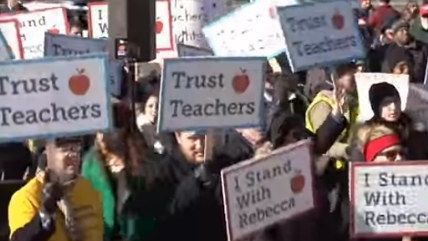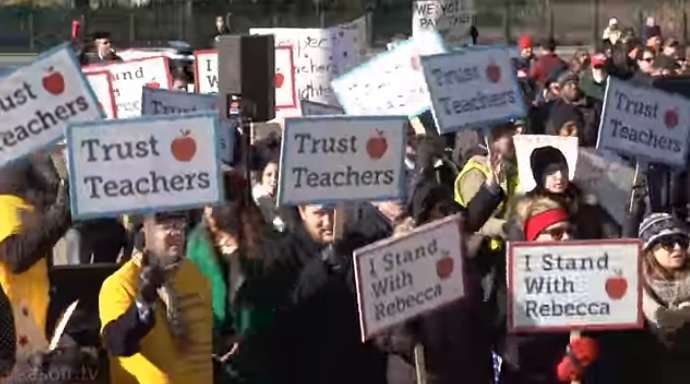Supporters of Public Unions Need to Be Asking Why People Want Out So Badly
The real threat to union power is failure to serve.


We will likely not know until June how the Supreme Court will decide the public employee union case Friedrichs v. California Teachers Association, but we know from Monday's arguments that it did not seem to be heading in the favor of the association. Damon Root analyzed the arguments yesterday, and his interpretation is far from an outlier. It's not unlike when the Supreme Court heard gay marriage arguments last spring, and it was pretty clear to the observer that the court was ultimately going to rule in favor of recognition.
Based on Monday's arguments, it seems very clear that come June the court is going to rule for some sort of scaling back of the authority for public sector unions to force employees to pay agency fees to represent them.
Progressive fans of unions are about as displeased about this development as religious conservatives were about the gay marriage decision. They see it as a huge threat to the future of labor unions and their complete and utter dissolution, with no possibility of survival. Also, of course, this must be couched in culture war left and right terms. Here's Elias Isquith's opening at Salon:
Earlier Monday, the Supreme Court listened to oral arguments for Friedrichs v. California Teachers Association, a case that could quite possibly lead to the death of unionization in the public sector as we know it. And if the first impressions of those who were in attendance are anything to go by, one of American society's last bulwarks against neoliberalism is very likely about to crumble …
And later in his piece:
If the Court sees things their way, it's likely that they'll disallow these mandatory contributions from non-members. If that happens, unions say, and the vast majority of outside observers agree, then these already-embattled unions will almost certainly be unable to afford their own perseverance. Suddenly, just like that, a "right-to-work" framework will be imposed on public unions across all 50 states. An inverse of Gov. Scott Walker's process, in other words, goes national.
Assuming the Court rules the way anti-public union types hope, many people will understand the decision in much the same terms as those I used to begin this piece. They'll say it is the inevitable next step in the long-term and long-apparent dissolution of organized labor in America. They'll note that public union members are disproportionately women and African-American. They'll say the conditions are set for the middle class to shrink further still. They won't be wrong.
Dahlia Lithwick at Slate says the Supreme Court is about to "kneecap" the unions in an assertion-laden piece that oddly seems to suggest that it is utterly bizarre for the Supreme Court to reconsider old precedents (as a gay man whose personal activities were once considered felonies, I would like to point out how thankful I am that they sometimes do):
In this world, embraced in full by the court's right wing Monday, money always equals speech; unions won't suffer at all for losing millions of dollars or much of their membership; precedent is only binding if you luuurve it; and the crushing harm caused by paying fees to an entity espousing messages with which you disagree far outweighs the harm arising from dismantling the nation's public-sector unions. And anyhow—how can we know how bad it would be to kneecap public-sector unions until we try it? Hey! Let's find out!
The responses seem to not want to engage—or handwave away—the constitutional issues at hand. What matters is that they don't like the consequences. Again, weirdly, the responses seem similar to objections to gay marriage recognition. Opponents didn't really care about the constitutional question of treating gay couples differently under the law as straight couples. They cared about the idea that it would somehow diminish or result in a reduction of heterosexual marriages as a response.
Many states already have right-to-work laws and still manage to have unions, albeit diminished ones. Lithwick notes this (and the argument's appearance in the court) but thinks this is still a very bad outcome because unions are nevertheless weaker. There is absolutely no engagement in either piece about how union contracts protect employees from being held accountable for misbehavior, no engagement in how unions game and abuse the system at the expense of taxpayers with unsustainable benefits that cannot be scaled back, no discussion of the problem with how police unions have played such a major role in keeping abusive cops in the field, and no engagement in unions' roles in manipulating legislation for its benefit (and to the public's detriment).
This is all about all those evil corporations, though the California Teachers Association politically outspends any private special interest in the state, second to Service Employees International Union, which also represents a lot of government employees. It's us vs. them, while ignoring the reality that it's the taxpayers who are the ones who are getting screwed over, not the Kochs. Also, note how Lithwick frames unions losing members and money as though this money and these people belong to the union and some fashion and are being stripped away from it. Not forcing people to be members is the same as taking something from the union. Where is agency for these people to decide what they want?
Let's ask a more important question: If these unions are so powerful and so valuable for its members, why do people want to leave? Given how powerful the California Teachers Association is, why would everything collapse? Why would people run away from that system?
Union defenders always point to the problem of "free riders," that people would want to have the same benefits without having to pay for the negotiating costs. My response is that people also want what they pay for and want a good deal for their money. The actual union members have very little individual leverage in the current system. They cannot walk away or "take their business elsewhere" if they feel the union is not doing its job.
In that sense, the anger over the possibility of losing mandatory fees reminds me an awful lot of the arguments against allowing for charter schools. Those who oppose charter schools often present the educators vs. corporations scenario as well, with not a lot of argument about the actual customers of the school system, parents and their children (except to point out that not everybody has access to charter schools, which is odd because these same people are trying to prevent the spread of them).
There is no respect for the agency of Rebecca Friedrichs in her desire to not be forced by law to fund a union's contract negotiations. It must be a right wing plot. Charter schools can't be cropping up because parents have had it up to here with the entrenched union interests dominating educational bureaucracy, draining funding, providing lousy services, and then blaming problems on the parents themselves. It must be a right wing plot, even somehow in minority communities in liberal Los Angeles and New York City.
If the unions are doing a good job representing their employees' needs, they have little to actually fear from workers being allowed to opt out. An opt out will help keep unions honest and thoughtful. Similarly good public schools and teachers have little to fear from charter school programs. They are a challenge to the mediocre and passive education systems that serve themselves heaping helping of tax dollars with little to show for their efforts.
Below, union members stuck in this system explain for themselves what they've experienced for Reason TV:


Show Comments (105)